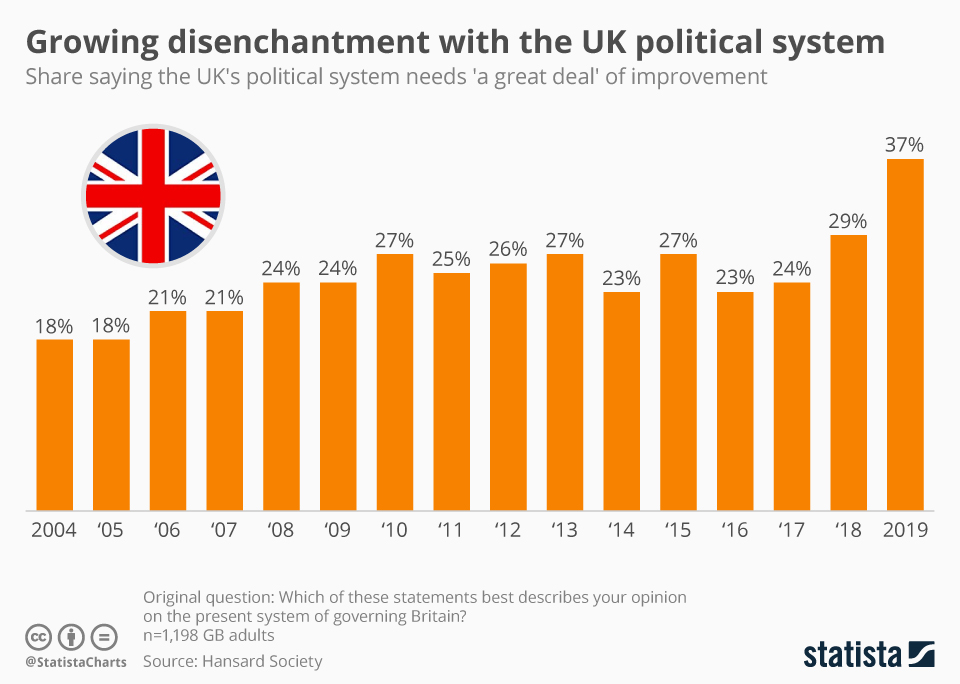I had lunch yesterday with an old (and elderly) friend who is in a despairing mood about what is happening to his country (the US) and the UK. Part of our conversation was about the nature of the seismic change that we both sense in those two democracies. (This was a theme of my earlier post below.)
Later in the evening, I sent him an excerpt from a column by my Observer colleague, Andrew Rawnsley, which illustrated one aspect of the change.
When people refer to the British constitution, they are talking about a hotch-potch of such conventions, combined with ancient charters, precedents, international agreements, legislative bolt-ons and unwritten understandings. The fabric of this messy tapestry is held together by a crucial thread. That is an underlying assumption that everyone can be trusted to behave in a proper way. In the absence of a formal constitution, British democracy is heavily reliant on politicians acting with honour and playing fair.
What if they don’t? What happens then? We may be about to find out if Boris Johnson faces a no-confidence vote this autumn, loses, refuses to quit as prime minister and barricades himself in Number 10 for long enough to force through a no-deal Brexit before an election can take place. This is a scenario so grotesque as to be scarcely believable. That doesn’t make it an impossible one.
What Rawnsley’s article illustrates is what we are discovering about the fragility of our democracies. Their survival depends on politicians respecting norms. But they seem to have no recourse to people who don’t respect — indeed flaunt their contempt for — those norms. So Johnson could lose a confidence vote and yet ignore the conventions. And as far as one can see there’s nothing that we could do about it — even if two million people marched in protest in London, he could sit it out.
Ah well, people say, that’s what you get when you don’t have a written constitution and make do with an ad-hoc patchwork quilt of conventions, precedents, jumbo jumbo and laws that passes for one in Britain. But the Americans do have a written constitution and a fat lot of use that seems to be in dealing with Trump. Again, what’s so shocking to liberals is the way the president is contemptuously flouting norms that were once regarded as semi-sacred. For example, it was more or less unthinkable until 2016 that a sitting president would use his office to enrich himself and his family in flamboyant style. (Think of the way the Trump hotel in Washington is now being milked for profits derived from foreign clowns who stay there in the hope that it might gain them some favour in the White House.)
The other topic in yesterday’s gloomy conversation was the awful sense of impotence many citizens (or subjects, in the UK case) feel as they watch this wanton despoliation of democratic norms. In that context, this quotation from a piece by Niamh Cullen in the London Review of Books, puts a nice historical spin on it:
“When I began to research my book on Piero Gobetti”, she writes,
the precocious young anti-fascist journalist and early victim of Mussolini, the world in which he lived seemed very remote to me. I could relate little of the post-1918 anger and desperation – the obsession with borders and national grievance, the struggle to make ends meet in times of unemployment and rising inflation, the angry men convinced they had been dispossessed – to my own circumstances. It was Dublin in the mid-2000s and the city was still feeling pretty boomy, with little hint of the global recession to come. The ideas and institutions of the EU seemed broadly secure and democracy was taken for granted. Now with the rise of populism and nationalism across Europe and the US, as responses both to the global recession and to the migration crisis, the anxiety, anger and fear of the 1920s and 1930s seem a little more real.
And now?
I feel as if I now have a little more insight into how it might feel to see the ideas and institutions of the state collapse around you, and yet still go about your life as if nothing much has changed. In the last several years, with the rise of right-wing populism in Europe, Brexit, the migration crisis and the increasingly palpable effects of climate change, the world has profoundly shifted on its axis. Yet I have done little about it. I imagine these feelings of inertia and dread – the conviction that something should be done to prevent this downward slide combined with the strong sense that I can do nothing – is what it might have been like to live through the normalisation of fascism in Italy in the 1920s. This is not to suggest that Johnson, Trump et al. are similar to Mussolini – they may be, but that is a whole different issue – but rather that the sense of crisis that people lived with in the 1920s has parallels to our own time, as the extreme becomes normal, and it becomes gradually more difficult to imagine how things could be different.

